Hello, You All. Here we come with another deployment post. This post includes the steps required for the Deployment of WinMerge using SCCM. We will use the WinMerge EXE Installer to deploy the client machines using Configuration Manager on the Client Machines.
WinMerge is a free software tool that can merge text files and compare data. By determining what has changed between versions and merging them, it is possible to determine how changes have changed between versions.
Windows-based WinMerge is an Open Source tool for differencing and merging. With WinMerge, you can compare both folders and files and see the differences in a visual text format that is easy to comprehend.
This post also contains solutions for “The software could not be found on any servers at this time” error in the Software Center. And fix for 87D01106 – Failed to verify the executable file is valid or to construct the associated command line.
- Citrix Receiver Workspace App Deployment using SCCM
- Deployment of Amazon WorkSpaces using SCCM | MSI Application Guide
You can easily download the WinMerge Application from the WinMerge link. WinMerge offers various installation options for the desktop application, and here you need to download the windows based setup of the WinMerge Application.
Prerequisites – Deploy EXE Application using SCCM
We have not seen any WinMerge MSI Application, so we need to use EXE Application to deploy and install the WinMerge Application. Now, before we proceed further, we must have these three things in advance, especially when we have a .exe setup:
- Installation Command/Uninstallation Command
- Detection Method
- Application Icon
With the help of the internet, one can find an Install command for any application. In our case, we have to search the install command for the WinMerge Application. After searching, the install command for the WinMerge Application is WinMerge-2.16.24-x64-Setup /verysilent /norestart.
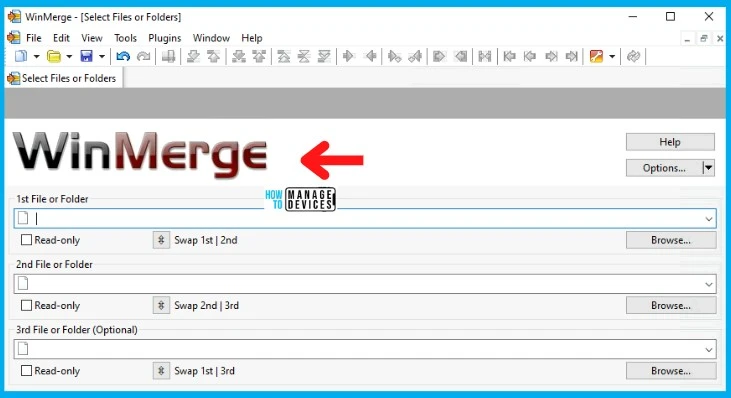
After you successfully installed WinMerge using the install command in your test environment. Now you have to look for the Uninstall command. For this, the Uninstall Command for WinMerge is “%ProgramFiles%\WinMerge\unins000.exe” /VERYSILENT /NORESTART.
| Install Command | Uninstall Command |
|---|---|
| WinMerge-2.16.24-x64-Setup /verysilent /norestart install | “%ProgramFiles%\WinMerge\unins000.exe” /VERYSILENT /NORESTART |
For Detection logic, we are using the File System setting type here. In File System, we will choose and pick any file from the folder where WinMerge gets installed in the directory. Here the path is:
- %ProgramFiles%\WinMerge
- Select the WinMergeU.exe file from this path and check the version details.
Create WinMerge Application Using SCCM Console
To start with the Application creation part, copy the downloaded WinMerge.exe setup to the package source location of the SCCM Server.
- Navigate to SCCM Console \Software Library\Overview\Application Management\Applications.
- Right-click on Applications and select Create Application.
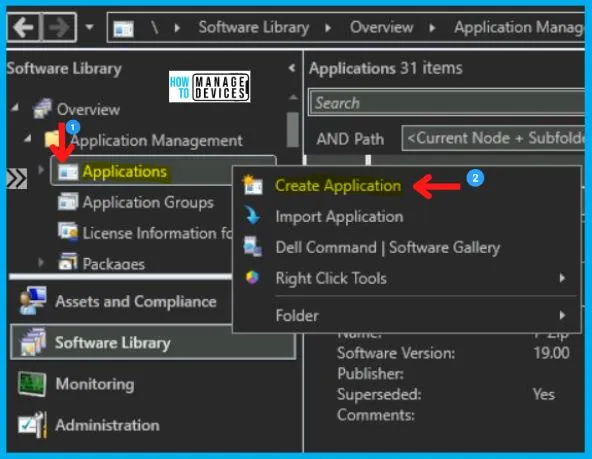
Whenever you have an EXE application, select the Manually Specify the Application Information option and click Next.
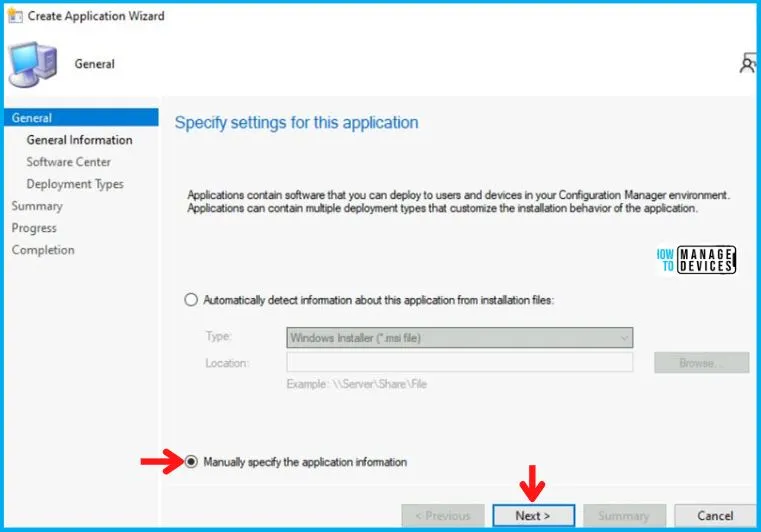
In the General Information Tab, you need to provide the metadata information of the SCCM WinMerge application. You need to enter the details like :
- Name and Software Version.
- And click on Next.
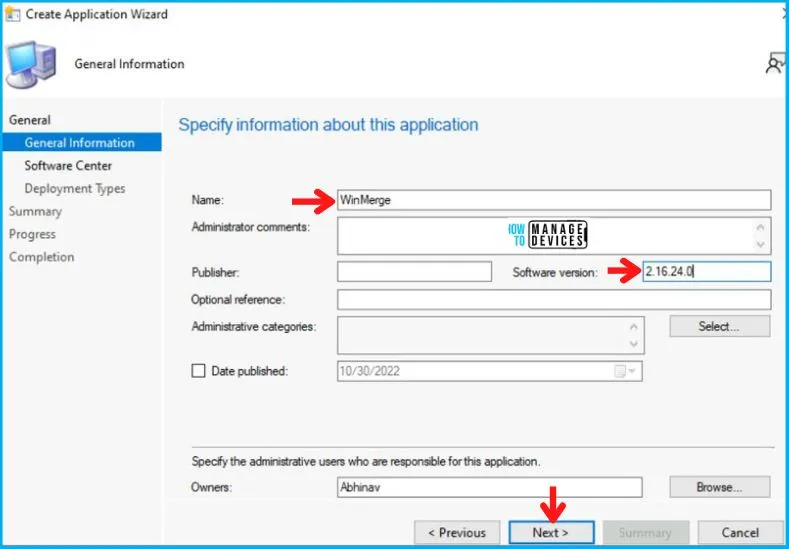
Then in the Software Center Tab, Enter the Application Name and upload the Icon by clicking on Browse. For more information about uploading icons, check the Easy Steps Software Center Icon for SCCM Application Deployment.
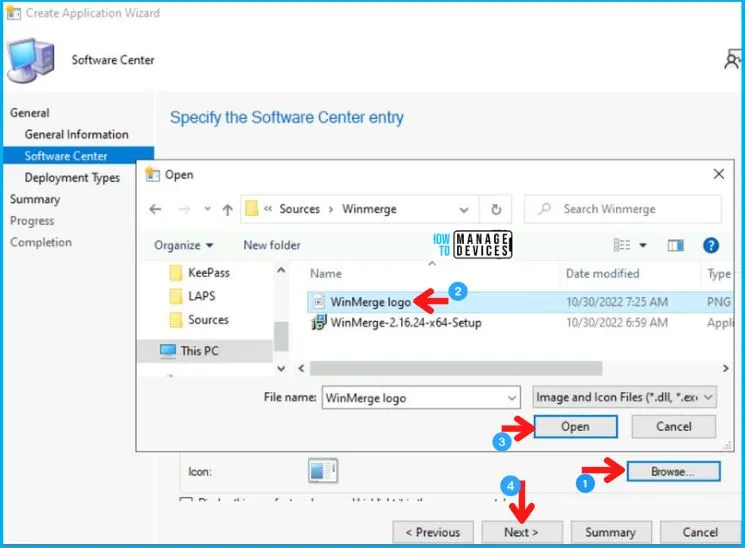
Now the Deployment Type Wizard will pop up, and in General Tab, select Manually Specify the Deployment type information and click on Next.
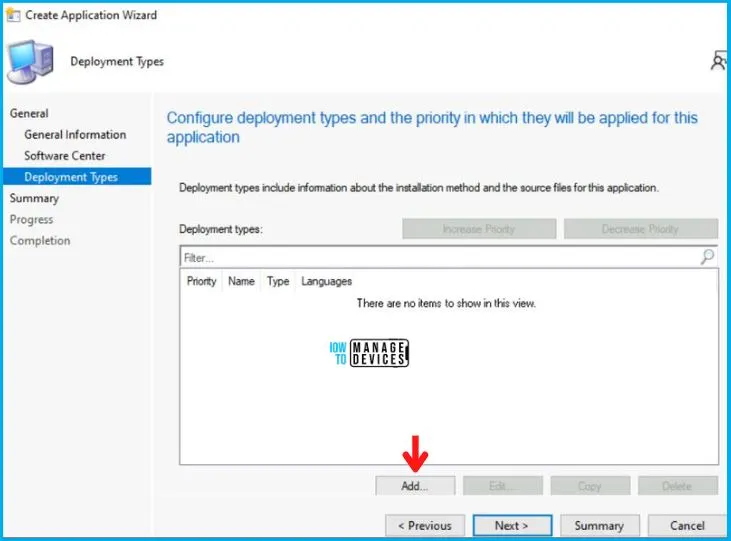
Now the Deployment Type Wizard will pop up, and in General Tab, select Manually Specify the Deployment type information and click on Next.
WinMerge App Install or Uninstall Command Lines
After this, the General Information Tab appears, in which you just have to enter the application’s name and click on Next. Now in Content Tab, enter the important details mentioned below and click Next.
- Content-Location (Browse for the UNC path where your setup is kept)
- Installation Program
- WinMerge-2.16.24-x64-Setup /verysilent /norestart install
- Uninstall Program
- “%ProgramFiles%\WinMerge\unins000.exe” /VERYSILENT /NORESTART
| Install Command Line for WinMerge | Uninstall Command Line for WinMerge |
|---|---|
| WinMerge-2.16.24-x64-Setup /verysilent /norestart install | “%ProgramFiles%\WinMerge\unins000.exe” /VERYSILENT /NORESTART |
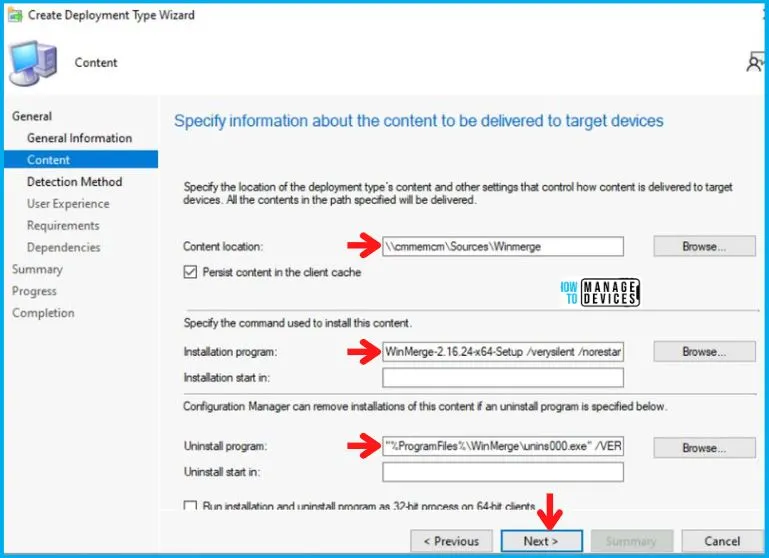
Detection Method for WinMerge App
Now in the Detection Method Tab, click on Add Clause, and a new Detection Rule page will pop up. Fill in all the details very carefully as mentioned below:
- Select File System in the Setting Type.
- Select File in the Type box.
- Copy the path in the Path box
- %ProgramFiles%\WinMerge
- Look for the file called “WinMergeU.exe“
The following table provides clearer options for a detection method for an exe (WinMerge.exe) file. The Receiver.exe file version is important to get the SCCM supersedence working.
| Setting Type | Path/Hive | File Name/Key |
|---|---|---|
| File System | %ProgramFiles%\WinMerge | WinMergeU |
NOTE! – You can check the better detection mechanism as per your organization’s requirement.
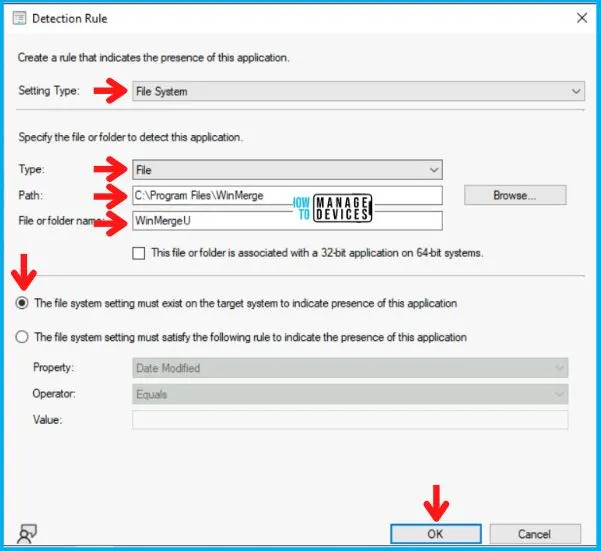
Now in the User Experience Tab, specify Install for the system in Installation behavior; in the Logon requirement, choose Whether or not a user is logged on. Set Installation Program Visibility to Normal as shown below and click on Next.
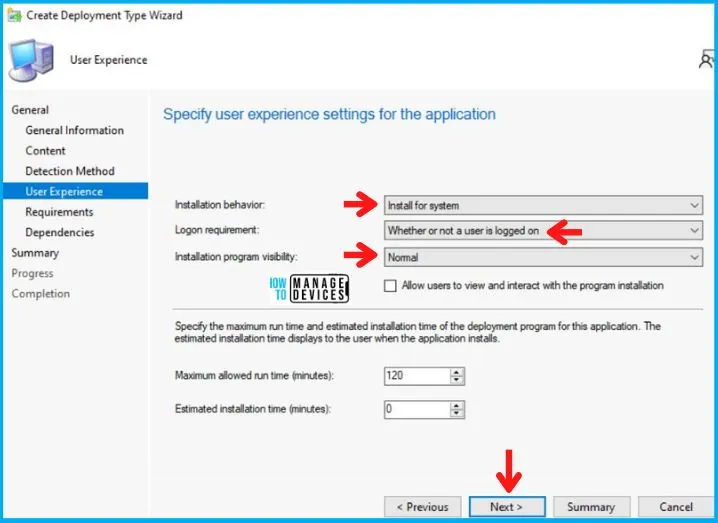
Click on Next in the Requirement, Dependencies, and Summary Tab. After this, in the end, Click on Close in the Completion Tab as shown below.
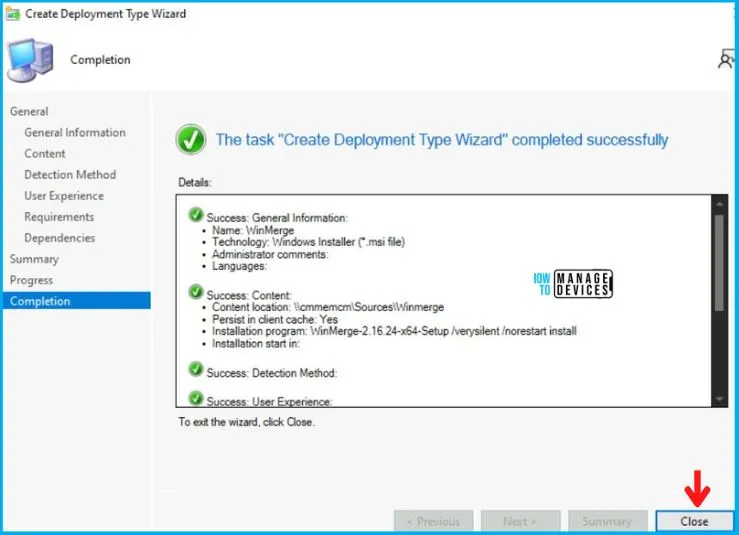
Then back in the Create Application Wizard, click Next in Deployment Tab. After this, click Next on the Summary Tab and end this Create Application Wizard by clicking on Close in Completion Tab.
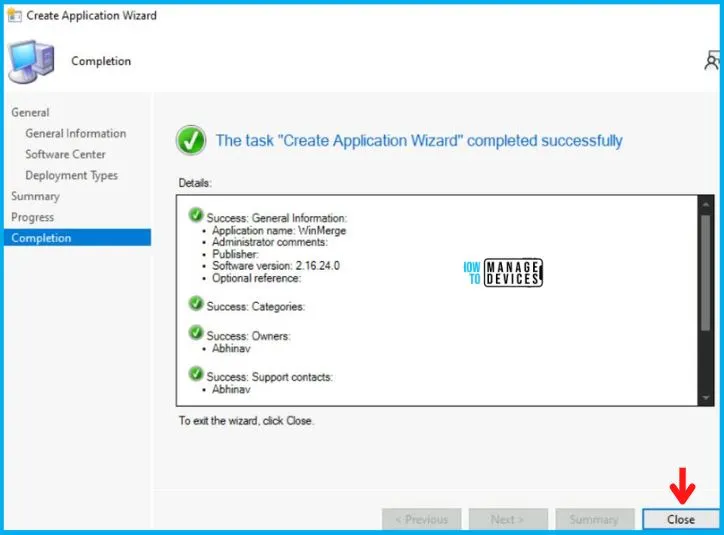
Distribute WinMerge Application to the SCCM DP
After creating the SCCM Application for WinMerge, it will appear in the Application Node. To begin with, the distribution right-click on the WinMerge Application and clicks on Distribute Content, as shown in the picture below.
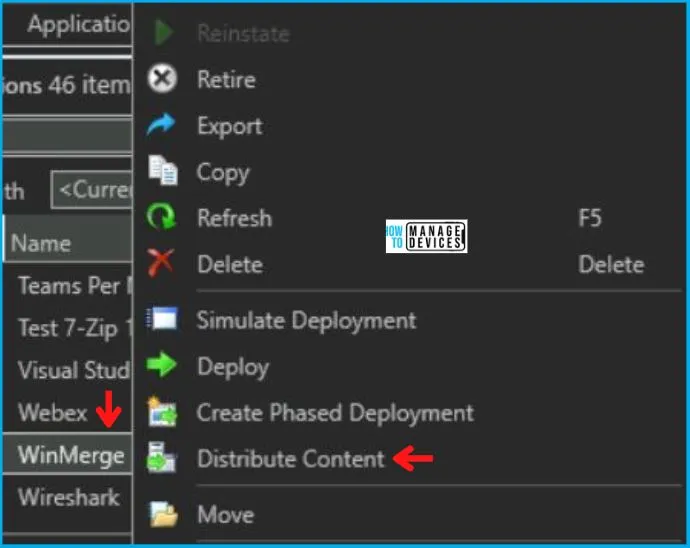
The Distribute Content Wizard will open, and click Next in the General Tab. Then select the Application Name in the Content Tab and Click on Next.
- After this, in the Content Destination Tab, Click on Add and select the Distribution Point option.
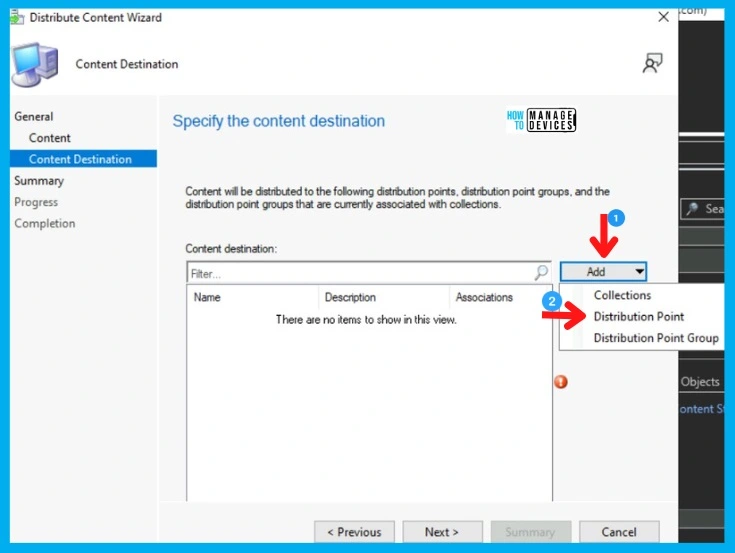
Then Add Distribution Point page will pop up, choose the Distribution Point on which you want to distribute the Application and click on OK, and then on Next.
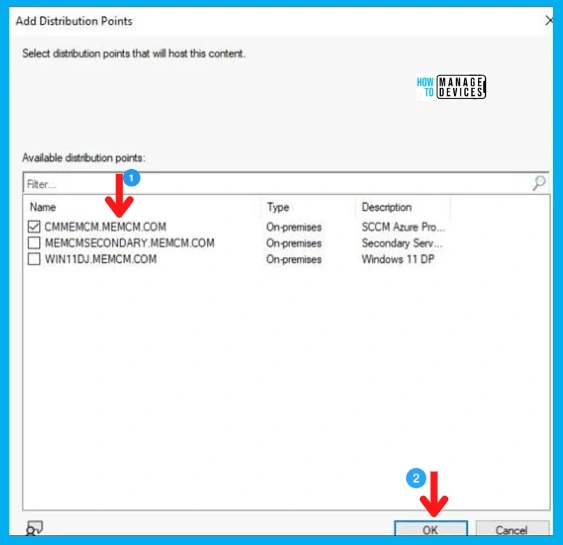
After this, Click Next on Summary Tab and complete this Distribution process by clicking Close on Completion Tab.
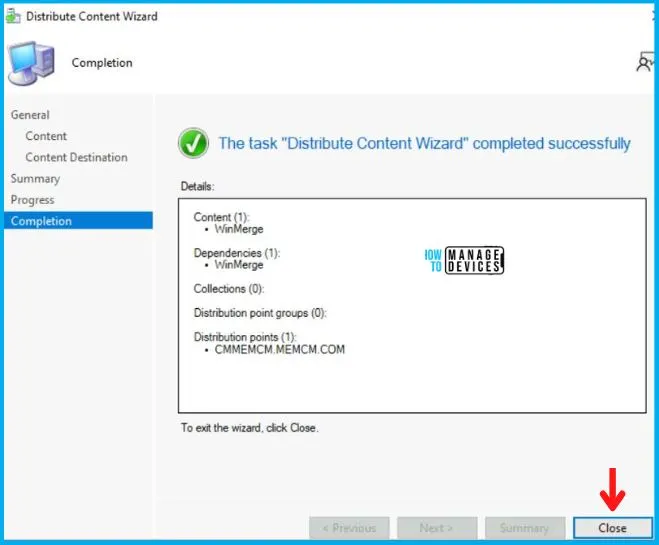
Deployment of WinMerge App using SCCM
So far, we have accomplished two tasks, i.e., Application Creation and Application Distribution to the DP. Now all that is left is the Deployment of the WinMerge Application on the All Windows 10 Device Collection.
- As you can see, your Application is displaying in Application Node, Right-click on WinMerge Application and select Deploy.
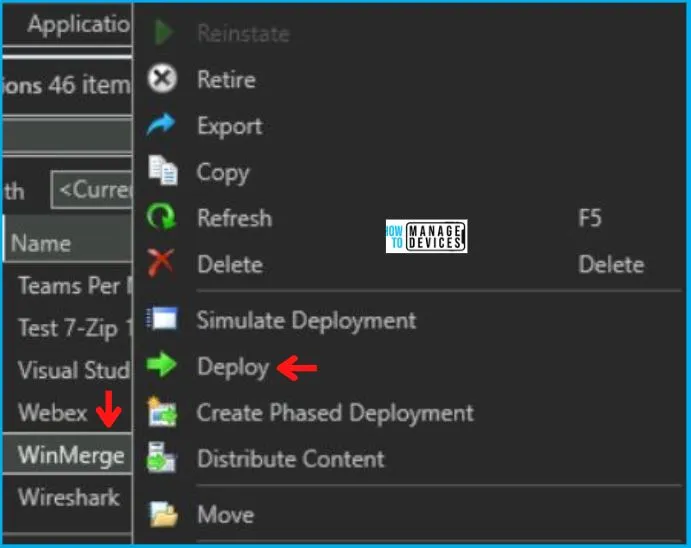
After this, Deploy Software Wizard opens, and in the General Tab, enter the Name of the Application and click on Browse to select the Collection.
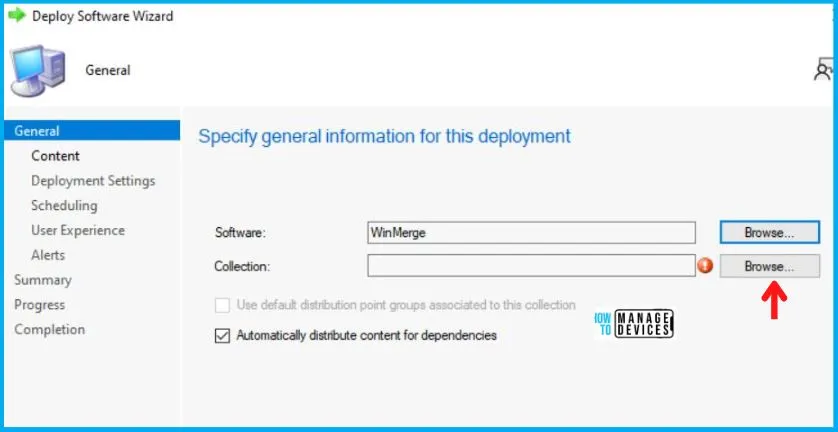
Now the Select Collection page will pop up; choose Device Collection from the drop-down menu, and then
- Select your targeted Device Collection and click on OK, and then Next.
- Here I choose All Windows 10 Devices or Windows 11 Devices.
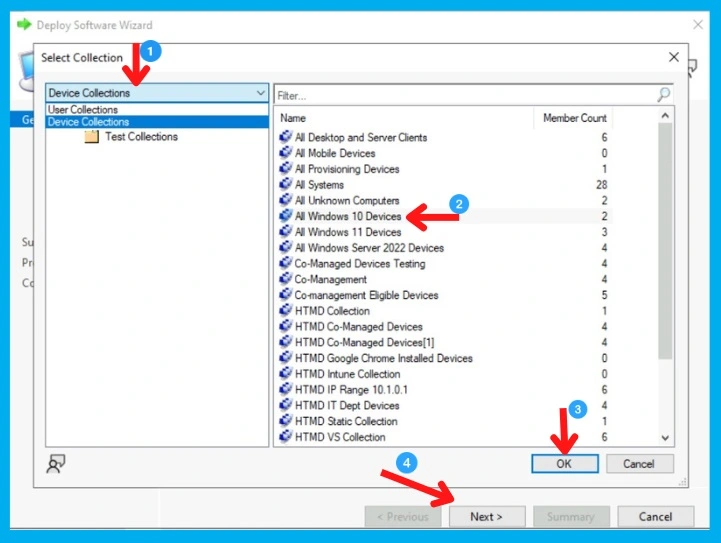
Now in the Deployment Settings Tab, select:
- Install in the Action box
- And choose Available in the Purpose category.
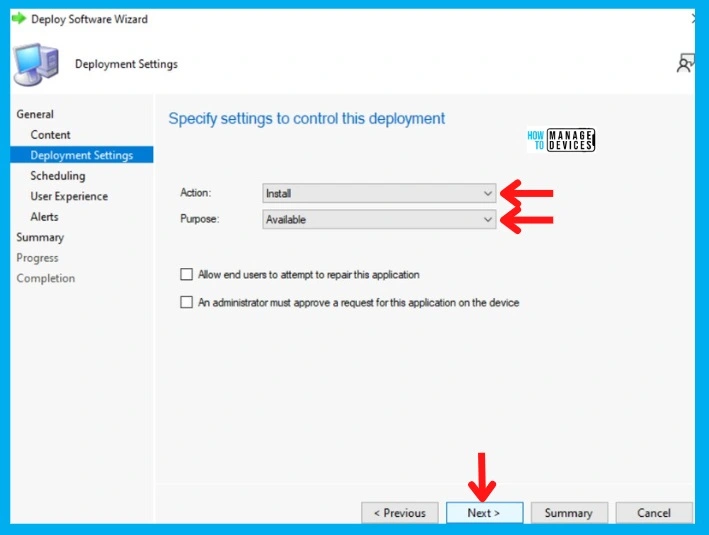
In the Scheduling Tab, enter the time details if you want it to be available at a specific time; otherwise, leave it as it is and click Next. After this, in the User Experience Tab,
- Select Display in Software Center and shows all notification options in the User
- Select Display in Software Center and shows all notification options in the User notifications, and click on Next as shown below.
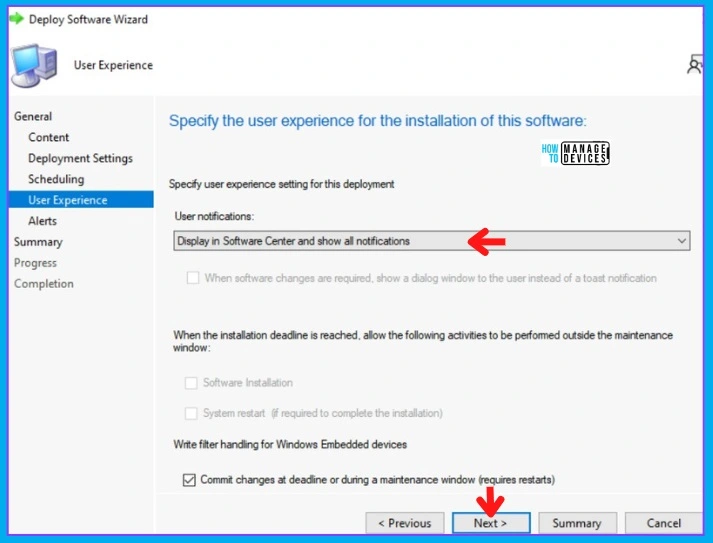
In the Alerts and Summary Tab, click on Next and to end the process, click on Close in the Completion Tab.
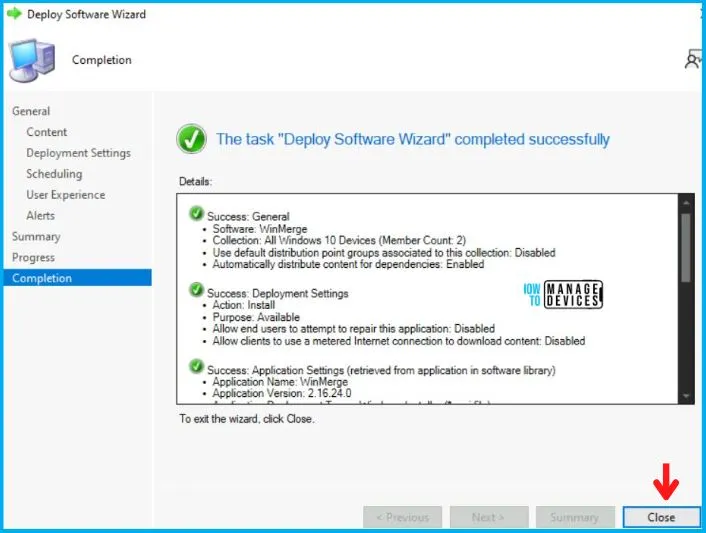
Windows 11 Client Machine
In this section, we will check the end-user experience for WinMerge Application Deployment and Installation. The WinMerge Application is Created, Distributed, and Deployed.
Now, if you check the Software Center of Win 11 device from the ALL Windows 11 Device Collection, you will see the application there in Available Mode, and the user can install it as per the requirement.
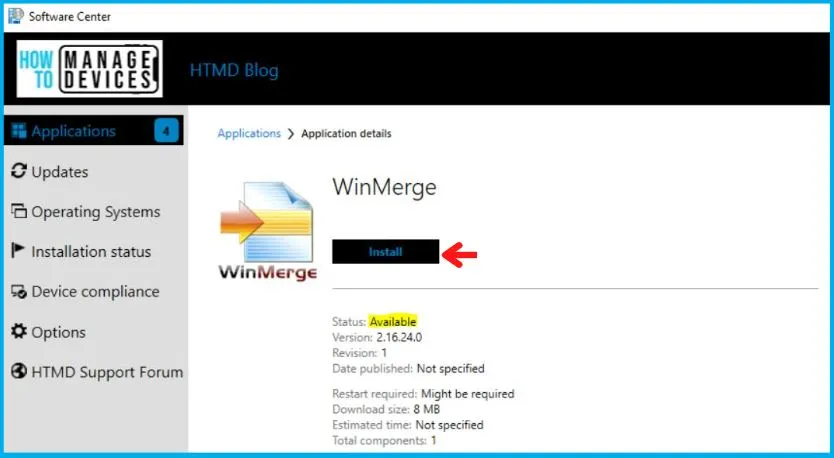
Troubleshooting WinMerge Application Deployment Issues
As you can see in the below screenshot, the WinMerge application is not installed successfully on some of the Windows 10/11 devices.
Although the application was successfully created, distributed, and deployed it. The failure of SCCM application deployment is common. Now we check the AppEnforce.log to check what’s the error – 0x87d01106.
For all the SCCM application deployment troubleshooting, you can refer to the HTMD guides given below. 87D01106 – Failed to verify the executable file is valid or to construct the associated command line.
EnforceApp(pContext, pSink, spInParams, spOutParams, spInstallStatus), HRESULT=87d01106 (C:\__w\1\s\src\DCM\WmiProvider\AppProvider\appprovider.cpp,844)
Method EnforceApp failed with error 87D01106
CAppProvider::ExecMethodAsync failed. Error 87d01106- Client Side -> Deep Dive SCCM Application Model Troubleshooting
- Server Side -> Insiders Guide SCCM Application Model Troubleshooting (anoopcnair.com)
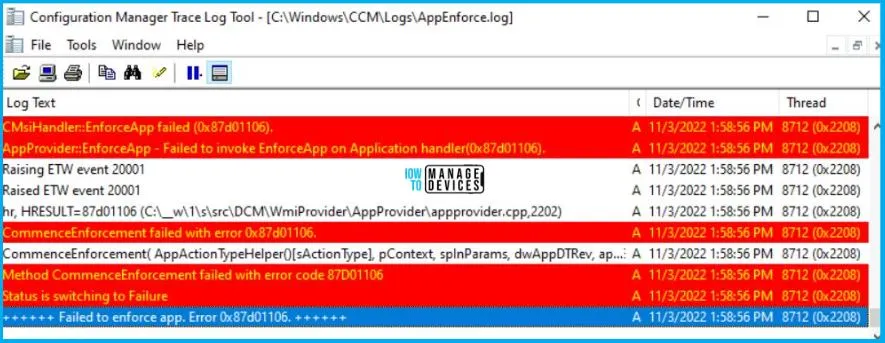
The software could not be found on any servers at this time is the other error in the Software Center. I’ve received this error on some Windows 11 or Windows 10 devices.
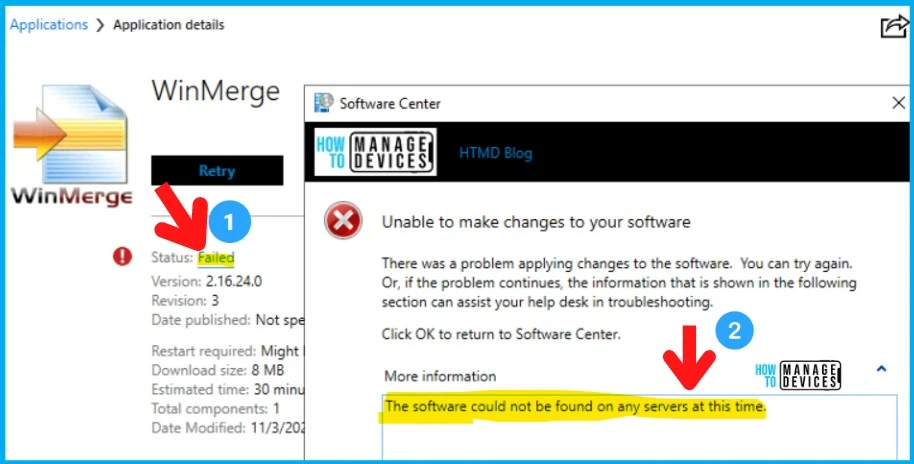
FIX Failed to verify the executable file is valid Issue
Solution -> I have deleted and recreated the WinMerge application. After this everything seems to work fine. This could be a very odd issue with SCCM application creation.
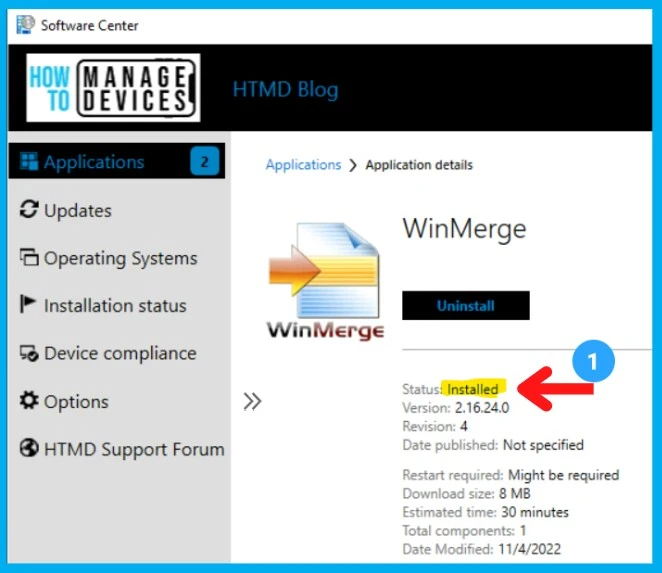
Author
Abhinav Rana is working as an SCCM Admin. He loves to help the community by sharing his knowledge. He is a BTech graduate in Information Technology.
